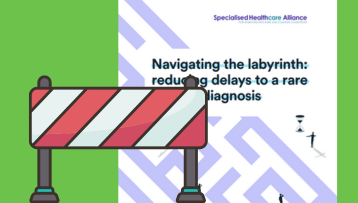The TSA has received a high number of enquiries through the TSA Support Line about covid-19 vaccines. Here, we explore some of the common questions that you have asked.
The TSA Support Line has received questions including:
- How quickly can people living with TSC and their carers be vaccinated against covid-19?
- Is it safe to be vaccinated with a particular vaccine if you have TSC?
- Who should I speak to if I have specific questions about how quickly I will be vaccinated or whether it is safe for me to be vaccinated?
Here, we have provided some further information on these topics and more.
How quickly can people living with TSC and their carers be vaccinated against covid-19?
The UK Government’s Joint Committee on Vaccinations and Immunisation (JCVI) has published their recommendations for who should receive the covid-19 vaccine the soonest (known as ‘priority groups’). The TSA’s understanding of what these vaccine priority groups mean for people living with TSC and their carers is being shared and continually updated on our website here.
Our understanding of the priority groups may change as more information becomes available from the JCVI and the NHS. We will update this page whenever additional relevant information is made available.
Is it safe to be vaccinated with a particular vaccine if you have TSC?
We have spoken to expert clinicians working in NHS TSC clinics, and the TSA is not aware of any evidence suggesting that covid-19 vaccines are unsafe for those living with TSC.
The following organisations are providing reputable advice and information about vaccines on behalf of the UK Government:
- The Medicines and Healthcare products Regulatory Agency (MHRA) on covid-19 vaccine licensing
- The Joint Committee on Vaccination and Immunisation (JCVI) on covid-19 vaccination steps and priority groups
- The National Health Service (NHS) for easy to read information about covid-19 vaccinations.
Will having the covid-19 vaccine mean that I need to alter any TSC treatments that I am receiving?
If you are being treated with mTORs for AMLs or SEGAs, you may wish to speak to your clinician about whether to stop taking the drug for a week before and a week after being vaccinated. However, if you are offered a vaccine at short notice you should take it, and not delay.
If you are taking mTORs for LAM or epilepsy, then it is probably better not to take a break from treatment. But, it is important to speak to your clinician.
The bottom line is that you should speak to your GP or TSC clinician before any decisions are made about whether to stop or continue treatment alongside vaccination.
Will children be vaccinated against covid-19?
Covid-19 vaccines are not currently routinely recommended for children and young people under 16 years of age, and children have not been prioritised for vaccination. This is because:
- There is limited data about how safe and effective these vaccines are in children yet, because they were not included in early clinical trials.
- Almost all children with covid-19 have no symptoms or mild disease
However, the JCVI has widened the number of children aged 12 or over who will be offered a covid-19 vaccine, which may mean that some children living with TSC will now be eligible for a jab. The JCVI has recommended that children aged 12-15 should be offered the vaccine if they have:
- Severe neurodisabilities
- Immunosuppression (this may include someone taking any dose of everolimus)
- Profound and multiple or severe learning disabilities.
We are not yet clear on the timescale for rolling out vaccinations to this group of children. Each UK government must make plans for how they will offer eligible children a vaccine, including a clear timetable for implementing the JCVI’s advice. We will update this page as more information becomes available.
Under previous JCVI guidance, young people aged 16-17 with underlying health conditions which put them at risk of serious covid-19 should have already been offered the Pfizer vaccine. The JCVI also recommends that children and young people aged 12 to 17 who live with an immunosuppressed person (this may include someone taking a very high dose of everolimus) should be offered the vaccine.
The JCVI is not recommending routine vaccination for children outside of these age or risk groups.
If you are caring for a child aged 12-15 and you think they will now be eligible for vaccination, you should speak to your GP or hospital specialist for their advice.
Will younger adults living in care settings be vaccinated?
Younger adults with TSC living in residential care homes will in most cases be eligible for vaccination because they are clinically extremely vulnerable or they have an underlying health condition that puts them at higher risk of serious disease or mortality. If a younger adult with TSC living in a residential care home does not fall into one of these high-risk groups, they should still be vaccinated alongside their fellow residents if vaccination of everyone living in their home is recommended because of the high risk of exposure for everyone living there.
Who should I speak to if I have specific questions about how quickly I will be vaccinated or whether it is safe for me to be vaccinated?
If you are concerned or have questions about your own individual clinical circumstances, or if you are a carer with questions you would like to ask on behalf of someone that you care for, you should discuss this with your/their GP or specialist TSC consultant.
For broader questions, you can contact the TSA Support Line to discuss this or any other TSC-related enquiry (0808 801 0700 / support@tuberous-sclerosis.org). We can also provide a listening ear if you are finding the current situation challenging and need to talk to someone for emotional or practical support.
It is understandable if you are feeling anxious or concerned at this time, but don’t forget that the TSA is here for you.
Make a one off or regular donation
£10 Can allow us to send a welcome pack to a family who has just received a life-changing TSC diagnosis, ensuring that they do not go through this time alone.
£25 Can help us develop materials that are included in our support services, flagship events or campaigns.
£50 Can provide laboratory equipment for a day’s research into the causes, symptoms, management or treatment of TSC.
To provide help for today and a cure for tomorrow










































































































